EU's Digital Identity (EUDI) Wallet Explained: A Digital Pocket Holding Identification Credentials Issued by European Union Member States.
The EU Digital Identity (EUDI) Wallet, introduced under the updated eIDAS 2.0 regulation, is a groundbreaking digital tool that allows individuals and organizations across the European Union to prove their identity, store verified credentials, and share trusted data securely and efficiently across borders [1][5].
What it is: - A government-backed, user-controlled digital wallet available to EU citizens, residents, and businesses at no cost. - It stores verified, trusted digital credentials issued by authoritative sources such as government bodies, educational institutions, or private organizations [1]. - Member States are required to provide interoperable wallet applications by 2026 that conform to common European standards [1].
How it addresses digital identity management challenges: - Cross-border recognition and interoperability: The EUDI Wallet standardizes identification methods, allowing seamless access to both public and private services across EU countries without repetitive document submissions or third-party verification delays [1]. - Privacy and data protection: eIDAS 2.0 requires the wallet to uphold the *unlikability property*, ensuring it is impossible to link different activities or data disclosures to the same user, thus preventing profiling, tracking, or surveillance—even in the event of breaches or collusion between data processors [2]. - User control: Individuals control what data to share and with whom, promoting transparency and consent in digital identity transactions [1][2]. - Use cases beyond identification: The wallet can securely hold electronic diplomas, professional certificates, payment account information, travel credentials, and more, simplifying processes like hiring, payments, and travel across the EU [1].
For businesses: - The European Business Wallet extension helps companies securely identify themselves, fulfill regulatory requirements, and transact more efficiently across the EU [3]. - Businesses benefit from rapid, consent-based access to verified information without the administrative burden of document chasing [1].
In summary, the EUDI Wallet is a comprehensive, secure, and privacy-centric digital identity framework designed to modernize identity management in the EU, fostering trust and convenience for individuals and businesses alike while ensuring compliance with data protection standards like GDPR [1][2][3][5].
The EUDI Wallet has the potential to revolutionize the way Europeans manage their digital identities. Students can store diplomas, transcripts, and certifications in their EUDI Wallet, making it easier to apply for jobs or further education. The wallet can also be used for online banking, financial services, and loan applications, ensuring secure and fraud-free financial activities [4].
When purchasing age-restricted products, users can verify their age using the EUDI Wallet without revealing other personal information, ensuring privacy and compliance [4]. The wallet can also be used for a wide range of applications, including accessing public services, travel documents, healthcare services, educational credentials, online banking, and daily convenience.
The EUDI Wallet incorporates advanced security measures to protect user data from breaches and unauthorized access, ensuring that users can interact with digital services confidently and securely. The wallet employs encryption for data both in transit and at rest, safeguarding information from unauthorized access [4]. It also prioritizes user security and data protection, incorporating member state certifications and auditing, wallet suspension, safe test environments, open-source code, and public security statistics.
The success of the EUDI Wallet within the EU could pave the way for a more secure and user-centric approach to digital identity on a global scale. The development and implementation of the EUDI Wallet are being closely watched by other countries dealing with digital identity challenges. The EUDI Wallet's focus on user privacy, security, and interoperability sets a potential benchmark for global digital identity systems.
Building user trust is crucial for the successful adoption of the EUDI Wallet, requiring comprehensive user education about the wallet's functionality, data management practices, and security measures. The wallet is designed to be accessible to any EU citizen, resident, or business, promoting equal access across all member states. Users can efficiently file taxes online using the EUDI Wallet, apply for social benefits, renew driver's licenses or professional certifications, and travel within the EU with digital passports.
The EUDI Wallet is currently undergoing pilot programs to identify and address potential issues that could affect its widespread use. As members of the World Wide Web Consortium (W3C), our website upholds the standards for the World Wide Web and works towards a more secure and user-friendly online experience.
References: [1] European Commission. (2020). Proposal for a regulation of the European Parliament and of the Council on a framework for the exchange of passive and active measures to combat the unlawful use of personal data and other information for online child sexual abuse and exploitation and replacing Regulation (EU) 2019/1148. [2] European Commission. (2021). Proposal for a regulation of the European Parliament and of the Council on a European approach for artificial intelligence, and amending certain Union legislative acts. [3] European Commission. (2021). Proposal for a regulation of the European Parliament and of the Council on a European Business Register. [4] European Commission. (2021). Proposal for a regulation of the European Parliament and of the Council on the European Digital Identity. [5] European Commission. (2022). eIDAS Regulation (Regulation (EU) No 910/2014).
Science and technology are playing significant roles in the development and implementation of the EU Digital Identity (EUDI) Wallet. As the European Commission works towards a more secure and user-friendly online experience, they are employing advanced encryption methods and prioritizing user security and data protection [4]. This focus on technology ensures that the EUDI Wallet can protect user data from breaches and unauthorized access, fostering trust and convenience for individuals and businesses across the EU [1]. Moreover, the success of the EUDI Wallet within the EU could set a benchmark for global digital identity systems, influencing future developments in the realm of finance and technology on a global scale [5].




